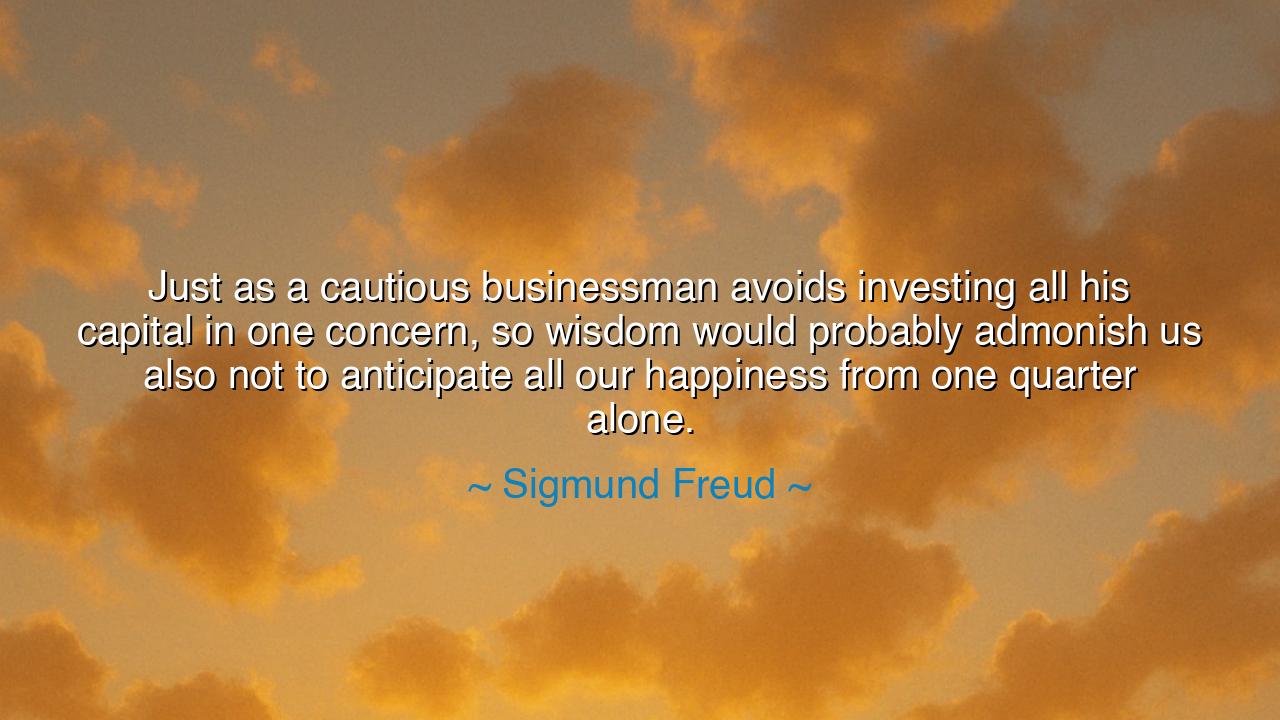
Just as a cautious businessman avoids investing all his capital
Just as a cautious businessman avoids investing all his capital in one concern, so wisdom would probably admonish us also not to anticipate all our happiness from one quarter alone.






“Just as a cautious businessman avoids investing all his capital in one concern, so wisdom would probably admonish us also not to anticipate all our happiness from one quarter alone.” — Thus spoke Sigmund Freud, the seeker of the human soul, who peered into the depths of desire and fear. His words are not merely a counsel of prudence, but a profound reflection on the nature of attachment and the fragility of joy. In this single sentence, he draws a bridge between the world of commerce and the world of the heart, teaching that both are governed by the same eternal principle: do not stake all your fortune upon a single hope, for life is change, and all things that burn too brightly may one day fade.
The origin of this wisdom lies in Freud’s contemplation of human suffering. He saw how men and women, in their longing for happiness, often cast their whole being upon one object — a lover, a dream, a faith, a career — believing it will complete them. Yet life, in its ceaseless motion, seldom allows permanence. To place all one’s capital of joy into one vessel is to invite despair when that vessel breaks. Freud, ever the realist, advised not cold detachment, but balance — that a wise soul distributes its affections and sources of happiness across many fields, so that the loss of one does not bring ruin to all. It is the philosophy of resilience clothed in the language of finance, a metaphor for the art of living well.
Consider the tragic story of Antony and Cleopatra, rulers of men, undone by love. When Mark Antony, mighty general of Rome, met Cleopatra, queen of Egypt, he placed all his joy, all his purpose, all his happiness, into her hands. His empire became secondary; his glory dimmed beneath the flame of his passion. When that flame faltered, his world collapsed. He had invested his entire soul’s fortune in one concern, and when that concern failed, he was left in ruin. Had he remembered Freud’s counsel — though spoken many centuries later — he might have tempered his love with duty, and his passion with wisdom. Thus, the story of Antony stands as an ancient warning for all who give their entire heart to one uncertain star.
Yet Freud’s insight does not condemn love, or devotion, or faith. It teaches the discipline of diversity — that life’s fullness is found not in a single joy, but in the harmony of many. A man may love his family deeply, yet find renewal also in friendship, in labor, in art, in solitude, in service. A woman may pour her heart into her vocation, yet still nurture beauty in her home, strength in her mind, and peace in her spirit. To seek happiness from only one quarter is to limit the infinite richness of life; to open oneself to many is to be anchored against the storms of fate.
Even the ancients understood this truth. The Stoic philosophers taught that all external things — wealth, fame, affection — are transient, and that the wise build their happiness upon many pillars, not one. Seneca wrote, “He who depends upon one thing is enslaved; he who depends upon nothing is free.” But Freud, speaking from the modern heart, adds a gentler note: that freedom does not mean emptiness, but equilibrium. It is not the absence of passion, but the diversification of it — a life lived with many loves, many purposes, many small suns, so that when one sets, the others may still bring light.
In the rhythm of existence, change is the only constant. Fortunes rise and fall, lovers come and go, health wanes, and seasons pass. Those who tie their happiness to one thing fight a losing battle against time. But those who weave their joy from many threads — kindness, curiosity, learning, nature, art, and love — possess a tapestry that time cannot easily unravel. Freud’s wisdom is thus not pessimism, but protection — the armor of the balanced soul against the inevitabilities of life.
So let this be the lesson: do not invest all your happiness in one dream, one person, or one possession. Cherish deeply, yes, but remember that life is vast. Spread your spirit across many fields; let each bring its own harvest. Cultivate love, but also purpose. Seek comfort in others, but also strength in yourself. For when you learn to draw joy from many wells, no drought can leave you desolate. The wise do not seek to escape loss — they prepare for it by learning how to live abundantly, so that when one joy fades, another rises to take its place. Thus, the soul remains whole, the heart endures, and happiness — like the sun — never truly sets.






AAdministratorAdministrator
Welcome, honored guests. Please leave a comment, we will respond soon